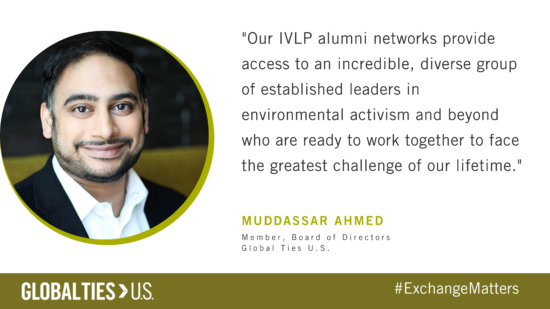
By Muddassar Ahmed, Global Ties U.S. Board Member
As a lifelong Londoner and an alumnus of two International Visitor Leadership Programs (IVLP), U.S. Secretary of State Antony Blinken’s announcement in May that the United States “has no closer ally, no closer partner, than the United Kingdom” reassured me and inspired me. I am glad to know the United States wants to lead again—because I believe the United States needs to lead again. But what kind of world does the country want to lead?
The answer depends as much on the challenges we face as on the values we uphold. For a Briton deeply connected to the United States, the fate of the West is of great concern. But for a person who is also of Pakistani ancestry and Muslim faith, my perspective is broader still. These multiple viewpoints converge on an overriding concern processed through the great humanitarian language of our time – climate change. The Biden Administration has made a substantial recommitment to saving the planet, but to be successful, the United States must make room for diverse voices, equitable policies, and inclusive solutions.
The United States has an opportunity to expand its approach and include a broad range of perspectives to address the climate crisis, such as by placing a higher priority on the impacts of climate change in the Muslim world, much of which is still developing. Muslims make up nearly a quarter of the world’s population. By the end of the century, that may increase to almost a third, making Islam the world’s largest religion. Many of those Muslims will live in countries particularly vulnerable to climate change on or near the Equatorial belt —Nigeria, Egypt, India and Pakistan, Indonesia. On humanitarian grounds alone, we have a potential crisis of historical proportions on our hands.
Further, the relative lack of (environmental) leadership in the Muslim world is concerning. While some countries, such as Saudi Arabia and Malaysia, have begun to articulate ambitious responses to our deteriorating environment, many others neither have such plans nor the capacity to implement them. This is where the United States can play a constructive role.
IVLP alumni make up a group of diverse voices that in turn reflect the perspectives that should be included in an effective approach to solving climate change. As the founder of an IVLP organization (the John Adams Society) and active member of the European Network of IVLP exchange alumni, I am reminded again and again of the power of people-to-people exchanges when it comes to solving problems, both big and small. Our IVLP alumni networks provide access to an incredible, diverse group of established leaders in environmental activism and beyond who are ready to work together to face the greatest challenge of our lifetime.
To begin to address this problem on a large scale, the United States must in turn adopt an approach that centers diversity, equity, and inclusion when searching for innovative and effective climate solutions.
Diversity, Equity, and Inclusion
By focusing on diverse voices in the climate change debate, seeking equity in environmental opportunity and outcome and inclusivity in constructing global guidelines and policies, the United States can begin to lead a global coalition that is much more fully representative of the planet than previous efforts.
Diversity, equity, and inclusion, after all, represent both U.S. and global values. And because these values are fundamentally democratic, they present an image of the United States committed to serving as a leading advocate of universal rights. As a country big enough to acknowledge when it has fallen short of these values, the United States can be bold enough to carry rhetorical exercises into actionable outcomes.
The United States has the ability to incorporate diversity, equity, and inclusion into its foreign policy through measurable standards, enhanced diplomatic relationships, and comprehensive international agreements. I have argued elsewhere for an example of such standards, albeit in the context of trade policy—for example, in a future U.S.-UK trade deal. (This is a proposal I have also elaborated on in a dedicated episode of my podcast, “PR Unmasked.”) Likewise, the United States could incorporate these metrics into climate agreements, environmental partnerships, and knowledge exchange.
Of course, simply saying this does not bring it about. To do so requires pushing the needle of U.S. public opinion. This will have the added impact of influencing change in the Muslim world when the United States is seen to be working for a broader set of interests. Leadership on these issues will compel those elsewhere—citizens, governments, and businesses—to stand up and join the struggle.
Global Ties U.S., with our Network of dozens of like-minded organizations established all over the country, can play a vital role in convening experts, hosting conversations, drafting white papers and policy proposals, and influencing public opinion. We could incubate, host, advance, critique, and measure the ideas and policies that would specifically push diversity, equity, and inclusion into U.S. climate policy more broadly.
In so doing, we can help the Biden Administration unite pressing domestic conversations with critical global crises, linking the fates of the United States’ most marginalized with the world’s most vulnerable, revitalizing foreign policy conversations, renewing U.S. public interest in the wider world, and making the case for U.S. leadership in an entirely new paradigm.
That is something all of us need, no matter which side of the Atlantic we happen to be on.
Muddassar Ahmed is Global Ties U.S. Board Member and an IVLP alumnus. He also hosts the bi- weekly podcast “PR Unmasked.” You can follow him on twitter: @mmuddassarahmed
